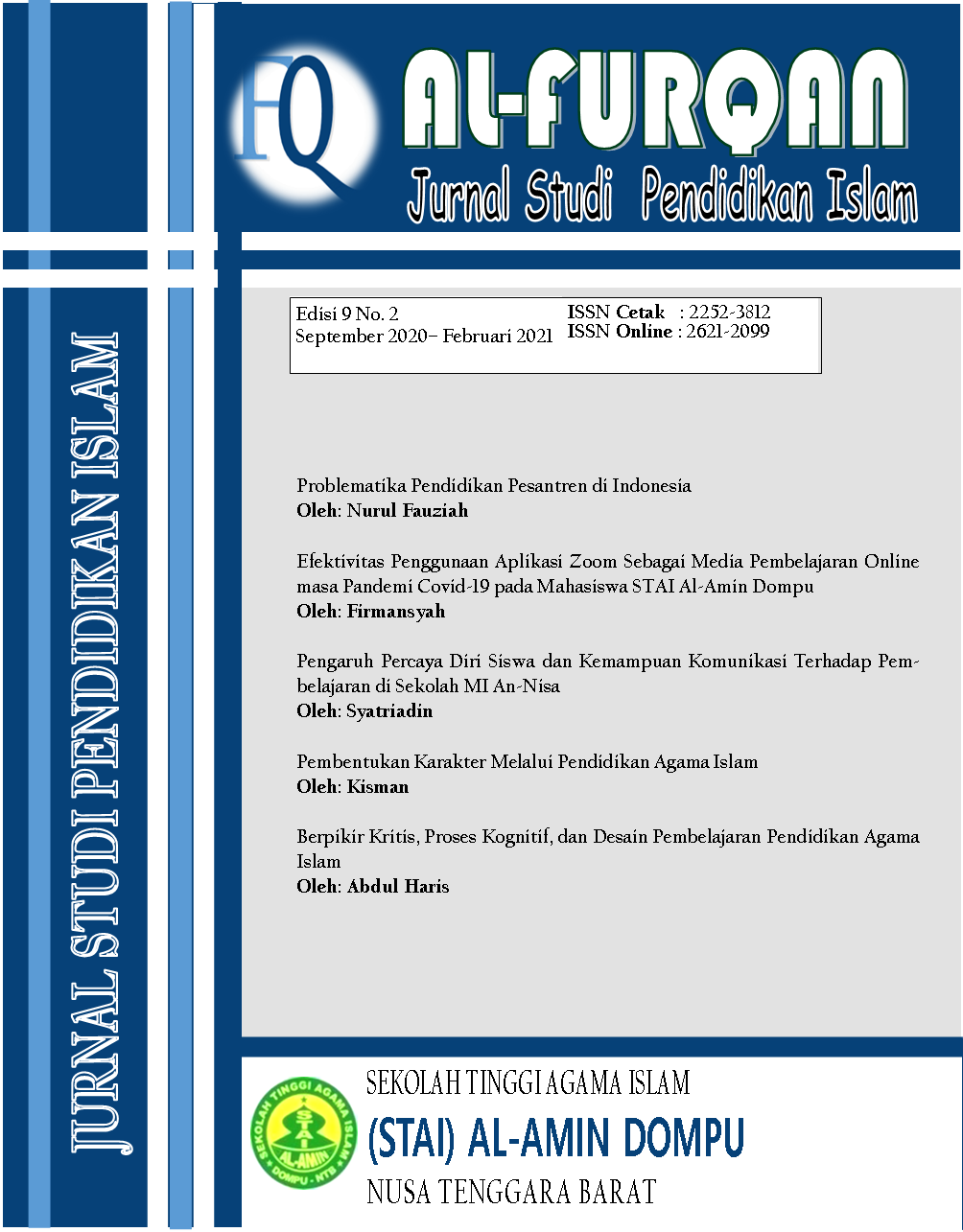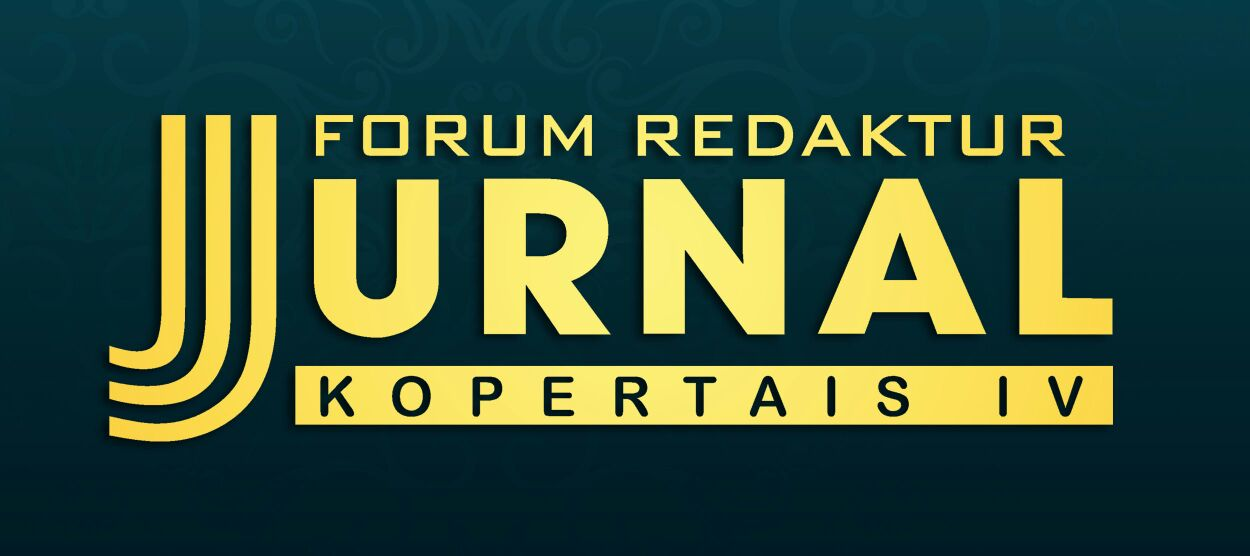Character Building Through Islamic Religious Education
Keywords:
Character Building, Islamic Religious Education
Abstract
This paper discusses the role of Islamic religious education in schools in character building for students. Islamic Religious Education (PAI) is one of the most important pillars of character education. Character education will grow well if it starts from the installation of a religious spirit in children, therefore Islamic education material in schools is one of the supports for character education. Through PAI learning, students are taught aqidah as the basis for their religion, taught al-Quran and al-hadith as their life guidelines, taught fiqh as legal signs in worship, teaching Islamic history is an example of life, and teaches morals as a guide for human behavior whether in the category good or bad. Therefore, the main purpose of PAI learning is the formation of personalities in students which are reflected in their behavior and thought patterns in everyday life. Besides that, the success of Islamic Education learning in schools is also determined by the application of appropriate learning methodsReferences
Abidin Ibnu, 1998. Pemikiran Al-Ghazali Tentang Pendidikan, Yogyakarta, Pustaka Pelajar.
Ajat, 2011, Mengapa Pendidikan Karakter?, Jurnal Pendidikan Karakter, Vol. 1, No. 1. Rusn,
Atikah Mumpuni, Integrasi Nilai Karakter dalam Buku Pelajaran: Analisis Konten Buku Teks Kurikulum 2013, Jakarta: Deepublish, 2018
Dirjen Pendidikan Tinggi Kemendiknas, Kerangka Acuan Pendidikan Karakter, 2010, h. 9 3
Farid Ahmadi dan Hamidulloh Ibda, Media Literasi Sekolah: Teori dan Praktik, Semarang, Jawa Tengah: Pilar Nusantara, 2018
Hamlan Andi Baso Malla, ‚Kajian Sosio Historis Tentang Politik Kebijakan Pendidikan Islam di Indonesia‛, Inspirasi, Nomor XIV Edisi Oktober 2011
Imam Mohtar, Problematikan Pembinaan Pendidikan Agama Islam pada Masyarakat, Ponorogo: Uwais Inspirasi Indonesia, 2017
Mahmud, Ali Abdul Halim, 2003, Tarbiyah Khuluqiyah Pembinaan Diri Menurut Konsep Nabawi, Terj Afifudin, Solo, Media Insani. Permendiknas No 22 Tahun, 2006. Standar Isi Untuk Satuan Pendidikan Tingkat Dasar Dan Menengah.
Permendiknas No 22 Tahun 2006, Tentang Standar Isi Untuk Satuan Pendidikan Tingkat Dasar Dan Menengah,
Ridla, Muhammad Jawwad, 2002. Tiga Aliran Utama Teori Pendidikan Islam Perspektif Sosiologis-Filosofis, Terj Mahmud Arif, Yogyakarta, Tiara Wacana Yogya Sudrajat
Rianawati, Implementasi Nilai-Nilai Karakter pada Mata Pelajaran Pendidikan Agama Islam, Pontianak: IAIN Pontianak Press, 2014
Suwito, 2004, Filsafat Pendidikan Akhlak Ibn Miskawaih, Yogyakarta, Belukar. Kebijakan Nasional Pembangunan Karakter Bangsa Tahun, 2010- 2025 Ulwan, Abdullah Nasih, Pedoman Pendidikan Anak Dalam Islam, Terj Sefullah Kamalie Dan Hery Noer Ali, Jilid 2, Semarang, Asy-Syifa. Tt Undang-Undang No. 20 Tahun 2003, Tentang Sistem Pendidikan Nasional
Shunhaji, Akhmad, ‚Islamic Religion Education Implementation in Catholic School Blitar City, East Jawa and the Impact on Participants of Social Interaction, dalam journal iiste, vol 9 No 36, 2018, https://www.iiste.org/Journals/index.php/JEP/article/view/45784
Undang-Undang No. 20 Tahun 2003, Tentang Sistem Pendidikan Nasional, h. 8
Ajat, 2011, Mengapa Pendidikan Karakter?, Jurnal Pendidikan Karakter, Vol. 1, No. 1. Rusn,
Atikah Mumpuni, Integrasi Nilai Karakter dalam Buku Pelajaran: Analisis Konten Buku Teks Kurikulum 2013, Jakarta: Deepublish, 2018
Dirjen Pendidikan Tinggi Kemendiknas, Kerangka Acuan Pendidikan Karakter, 2010, h. 9 3
Farid Ahmadi dan Hamidulloh Ibda, Media Literasi Sekolah: Teori dan Praktik, Semarang, Jawa Tengah: Pilar Nusantara, 2018
Hamlan Andi Baso Malla, ‚Kajian Sosio Historis Tentang Politik Kebijakan Pendidikan Islam di Indonesia‛, Inspirasi, Nomor XIV Edisi Oktober 2011
Imam Mohtar, Problematikan Pembinaan Pendidikan Agama Islam pada Masyarakat, Ponorogo: Uwais Inspirasi Indonesia, 2017
Mahmud, Ali Abdul Halim, 2003, Tarbiyah Khuluqiyah Pembinaan Diri Menurut Konsep Nabawi, Terj Afifudin, Solo, Media Insani. Permendiknas No 22 Tahun, 2006. Standar Isi Untuk Satuan Pendidikan Tingkat Dasar Dan Menengah.
Permendiknas No 22 Tahun 2006, Tentang Standar Isi Untuk Satuan Pendidikan Tingkat Dasar Dan Menengah,
Ridla, Muhammad Jawwad, 2002. Tiga Aliran Utama Teori Pendidikan Islam Perspektif Sosiologis-Filosofis, Terj Mahmud Arif, Yogyakarta, Tiara Wacana Yogya Sudrajat
Rianawati, Implementasi Nilai-Nilai Karakter pada Mata Pelajaran Pendidikan Agama Islam, Pontianak: IAIN Pontianak Press, 2014
Suwito, 2004, Filsafat Pendidikan Akhlak Ibn Miskawaih, Yogyakarta, Belukar. Kebijakan Nasional Pembangunan Karakter Bangsa Tahun, 2010- 2025 Ulwan, Abdullah Nasih, Pedoman Pendidikan Anak Dalam Islam, Terj Sefullah Kamalie Dan Hery Noer Ali, Jilid 2, Semarang, Asy-Syifa. Tt Undang-Undang No. 20 Tahun 2003, Tentang Sistem Pendidikan Nasional
Shunhaji, Akhmad, ‚Islamic Religion Education Implementation in Catholic School Blitar City, East Jawa and the Impact on Participants of Social Interaction, dalam journal iiste, vol 9 No 36, 2018, https://www.iiste.org/Journals/index.php/JEP/article/view/45784
Undang-Undang No. 20 Tahun 2003, Tentang Sistem Pendidikan Nasional, h. 8
Published
2021-02-24
How to Cite
KISMAN, K. Character Building Through Islamic Religious Education. AL-FURQAN, v. 9, n. 2, p. 33-42, 24 Feb. 2021.
Section
Articles
Copyright (c) 2021 AL-FURQAN

This work is licensed under a Creative Commons Attribution-NonCommercial-NoDerivatives 4.0 International License.






